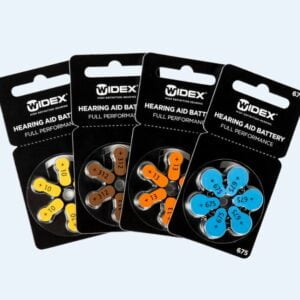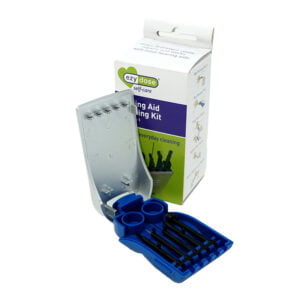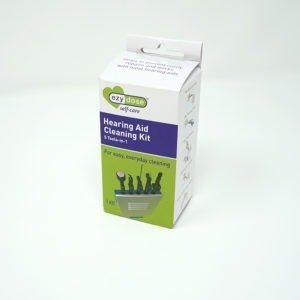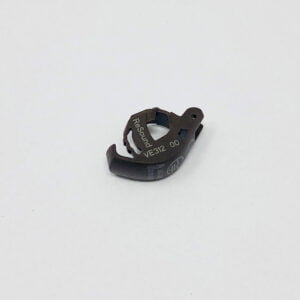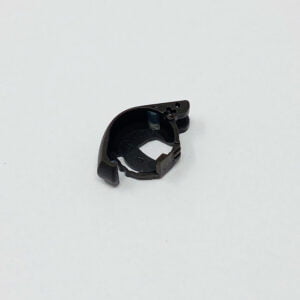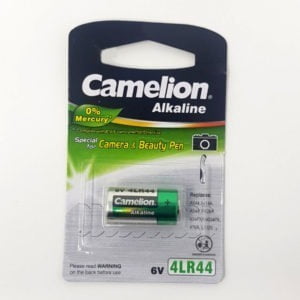Hearing Aid Batteries
Reliable hearing aid batteries can make the difference between crystal-clear hearing and an unreliable earpiece. We pride ourselves on offering a wide selection of batteries in various sizes, including 10, 13, 312, and 675. We only stock trusted brands such as Phonak and Rayovac, ensuring you receive the highest quality products.
-
- Out of Stock
Widex Hearing Aid Batteries – Size 312 …
- £3.99
- Single packet of 6 batteries, handy to keep with you on the go or if you’re going away. Ideal for all aids that use disposable batteries. *Please ensure that you have selected the correct size for your hearing aids* Brand : Widex/Rayovac
- Read more
-
-
5-in-1 Hearing Aid Cleaning Tool Kit…
- £8.49
- This cleaning tool kit includes 5 tools for fast and effective daily cleaning. Includes : wax removal brush, wax removal pick, tube & vent cleaner, battery door opener and battery replacement magnet. All in which comes in a handy flip case with a battery storage compartment.
- Add to basket
-
Widex Hearing Aid Batteries – Size 10 (…
- £3.99
- Single packet of 6 batteries, handy to keep with you on the go or if you’re going away. Ideal for all aids that use disposable batteries. *Please ensure that you have selected the correct size for your hearing aids* Brand : Widex/Rayovac
- Add to basket
-
Widex Hearing Aid Batteries – Size 10 (…
- £14.99
- A box of 10 packs of batteries, with each pack containing 6 batteries, for a total of 60 batteries. These are a great way to stock up on essentials, whilst saving some money too! Ideal for all aids that use disposable batteries. *Please ensure that you have selected the correct size for your hearing aids* Brand : Widex/Rayovac
- Add to basket
-
GN Resound Linx² 61 – 312 Replacement …
- £9.99
- A replacement battery door suitable for GN Resound Linx² hearing devices. Available in a variety of colours to match your hearing aid. Battery door size 312. If you are unsure about your device’s compatibility, then it is recommended to check with your audiologist or our dedicated support staff. Brand: GN Resound Includes: x1 Replacement Battery Door Please note these items are…
- Select options This product has multiple variants. The options may be chosen on the product page
-
Widex Hearing Aid Batteries – Size 13 (…
- £14.99
- A box of 10 packs of batteries, with each pack containing 6 batteries, for a total of 60 batteries. These are a great way to stock up on essentials, whilst saving some money too! Ideal for all aids that use disposable batteries. *Please ensure that you have selected the correct size for your hearing aids* Brand : Widex/Rayovac
- Add to basket
-
Widex Hearing Aid Batteries – Size 13 (…
- £3.99
- Single packet of 6 batteries, handy to keep with you on the go or if you’re going away. Ideal for all aids that use disposable batteries. *Please ensure that you have selected the correct size for your hearing aids* Brand : Widex/Rayovac
- Add to basket
-
Camelion Alkaline Battery – 4LR44…
- £6.49
- High performance battery with a stable voltage level, long durability, and superior alkaline technology. Ideal for the Bellman & Symfon Door Transmitter. Brand: Camelion This product includes: 1x Camelion Alkaline Battery
- Add to basket
-
Widex Hearing Aid Batteries – Size 675 …
- £3.99
- Single packet of 6 batteries, handy to keep with you on the go or if you’re going away. Ideal for all aids that use disposable batteries. *Please ensure that you have selected the correct size for your hearing aids* Brand : Widex/Rayovac
- Add to basket
-
Widex Hearing Aid Batteries – Size 675 …
- £14.99
- A box of 10 packs of batteries, with each pack containing 6 batteries, for a total of 60 batteries. These are a great way to stock up on essentials, whilst saving some money too! Ideal for all aids that use disposable batteries. *Please ensure that you have selected the correct size for your hearing aids* Brand : Widex/Rayovac
- Add to basket
FAQ
What sizes of hearing aid batteries are available?
There are four main sizes of hearing aid batteries, colour-coded and numbered for easy identification. Manufacturers are also developing even smaller batteries that retain the same power.
- Blue 675: The largest hearing aid battery, providing the greatest amount of power.
- Orange 13: Commonly used in smaller behind-the-ear hearing aids and larger in-the-ear models.
- Brown 312: Similar circumference as the 13 but half the depth, making it slightly fiddlier. Suitable for smaller behind-the-ear aids.
- Yellow 10: The smallest battery, designed for in-the-canal hearing aids.
How long do hearing aid batteries last?
Hearing aid batteries usually last between 5 to 10 days, depending on the size:
- Blue Size 675: 7-10 days
- Orange Size 13: 7-10 days
- Brown Size 312: 5-7 days
- Yellow Size 10: 7-10 days
What are hearing aid batteries made of?
Hearing aid batteries typically use zinc air technology, which oxidises zinc with oxygen from the air. This ensures they are safe and efficient to use.
How do I place the battery in my hearing aid?
Most batteries have a peel-off back. Once removed, place the battery carefully inside the hearing aid. Allow the battery to sit for a minute after removing the peel to maximise its oxygen reserve, which can extend battery life.
What happens when I put a battery in my hearing aid?
After you’ve placed the battery in your hearing aid, it begins to work immediately, powering your device. Letting the battery sit for a minute after peeling off the back ensures optimal performance.
How should I store hearing aid batteries?
Store hearing aid batteries at room temperature, avoiding damp areas and extreme temperatures. Proper storage maximises their lifespan and maintains their quality.
How do rechargeable hearing aid batteries work?
Most rechargeable batteries use Li-ion (Lithium Ion) technology, known for its efficiency and long-term power storage. These batteries are increasingly being integrated directly into hearing aids, providing protection against water damage and eliminating the need for manual battery changes.
What is the advantage of built-in batteries?
Having the battery built into the hearing aid prevents water damage and simplifies usage, as there’s no need to remove or insert batteries manually.
Do I need a hearing aid dryer?
Hearing aid dryers, such as drying boxes, help extend the lifespan of both your hearing aids and their batteries by removing moisture. This is particularly important if you live in a humid environment or are prone to perspiration.

